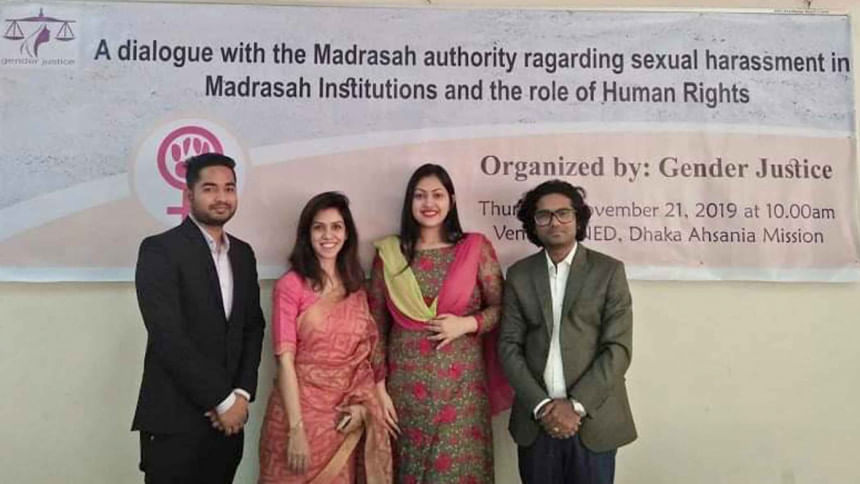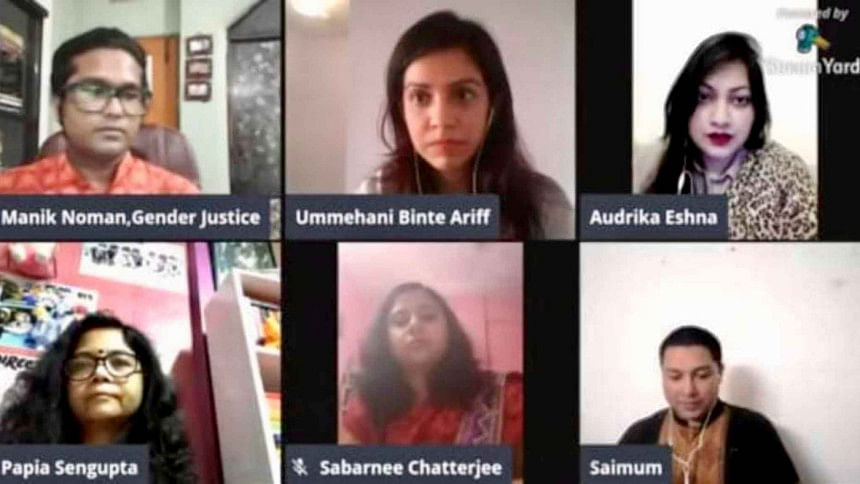Ensuring equality by dismantling social injustices

Gender Justice is a non-profit legal and policy advocacy organisation with steadfast commitment to addressing the chain of circumstances relevant to gender- based violence and inequality. It was founded on International Women's Day 2019. The organisation has been active through their human rights campaigns, consultancy, workshops and a helpline. Their helpline numbers are +8801681188407, +8801925730720.
The core team of Gender Justice consists of its Founder and Executive Director Umme Hani Binte Ariff and Co-Founder and Director Abdullah Al Noman, both of whom are advocates at the Supreme Court of Bangladesh, and Director Audrika Eshna Purbasha, who is an electrical engineer by profession and a human rights activist by passion. "Gender justice is a systematic process of dismantling patriarchy to establish equity, equality and ensure social justice," asserted Umme.
Noman explained the motive behind the inception of their organisation. "Theoretically, we are a democratic nation with equal rights for all genders, however, it is not the same in terms of practical implications even in this era. Whatever equality we are observing around us has to do with people belonging to socio-economic segmentations of the middle class and above but in many cases, women below that class are subject to displeasing violations and are unaware of their rights," he said. "Without them being at par, we can never build a strong nation or call ourselves a gender equal society. Gender Justice wants to establish the importance of justice and equality."
Gender Justice wants to cater to underprivileged women and the more conservative education system, outside of the country's mainstream arrangements, given how their legal and human rights are violated at every step of the way. "We thrive to be the voice of the unheard," said Audrika.

Their foremost project incorporated raising awareness and building capacity regarding legal rights in front of the state authority, for female students in madrasas. The project covered the steps to take if those rights are violated and if there are cases of sexual harassment. Gender Justice conducts their workshops in two parts. At first, they ensure that the authority of the madrasahs is aware of the consequences of violations of rights of the female students under their supervision and then, they move on to the students.
They start off by carrying out a survey on the students regarding their knowledge about their own rights prior to the workshop, which allows Gender Justice to understand their audience better. Till now they have reached out to madrasa students in areas such as Mohammadpur, Dhanmondi and Kamrangichar.
Gender Justice consults people for free though their helpline, and even relay issues to the local police in extreme cases. The organisation has been a house to many passionate undergraduate Law students, who have been exposed to many dejected stories of gender based violence and gathered real life experiences prior to moving on to their own professional lives.
Faria Nowshin, an LLB third-year student at University of London said, "I have had the opportunity to work with Gender Justice and contribute in some of their activities and research projects, such as sexual harassment in madrasas in our country. We have always been responsive towards raising voice against any gender- based violence and actively promoted gender equality through addressing the core problems and possible solutions in the workshops and seminars conducted by Gender Justice."
Amidst the pandemic, Gender Justice introduced a wing, solely to cater to cyber bullying and sexual harassment cases through their support group. The core team shared many despairing stories with The Daily Star, related to gender-based violence, maintaining the anonymity of the victims. One young girl was harassed online by her own classmate. Such incidents are plentiful, yet women are unable to take necessary steps because they are unaware of their own rights, and are overly cautious of the social taboos and victim-blaming conventions. Most regretfully, they do not receive family support. All these obstacles often lead the victims to suicide.
Gender Justice's future prospects comprise of working on the indigenous women of our country. Based on their research projects, they are trying to create a healthy support space for the victims. Noman further talked about keeping balance in the society. "A group of people are only becoming modern with every passing day, however, another group is being marginalised and constantly overlooked. We, as a nation, need more organizations to work for all these unheard people," he said.
Gender Justice is grateful to A. F. Hassan Ariff Associates, a Bangladeshi law firm headed by A. F. Hassan Ariff, former Attorney General of Bangladesh and Advisor of Caretaker Government, for their support.

 For all latest news, follow The Daily Star's Google News channel.
For all latest news, follow The Daily Star's Google News channel. 



Comments